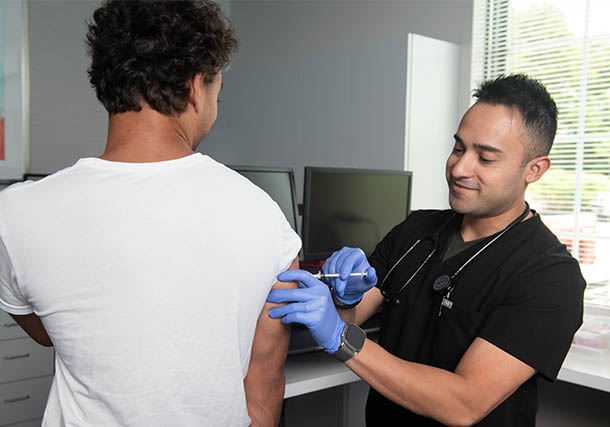
Drug Allergy Treatment in Charlotte
Drug allergies can be a serious and potentially life-threatening condition for many individuals. Even mild symptoms, such as hives or itching, can be uncomfortable and interfere with daily life. At Carolina Asthma & Allergy Center, we understand the impact that drug allergies can have on your health and well-being, and we are committed to providing comprehensive care to help manage and treat this condition.
Our team of board-certified allergists and experienced healthcare professionals is dedicated to providing personalized treatment plans and ongoing support to help you live your life to the fullest. Whether you are seeking a diagnosis, treatment, or ongoing management of your drug allergies, we are here to help you every step of the way.
How to Request an Appointment
At Carolina Asthma and Allergy Center, we offer comprehensive evaluation and treatment for drug allergies. If you suspect you may have a drug allergy or have experienced symptoms after taking a medication, you can request an appointment with our team of board-certified allergists and experienced healthcare professionals.
To schedule an appointment, you can call our office or fill out the online appointment request form on our website. Our friendly staff will work with you to find a convenient date and time for your visit.
During your appointment, our allergists will review your medical history, perform a physical exam, and conduct any necessary tests to determine if you have a drug allergy. Based on your evaluation, our team will develop a personalized treatment plan to help manage your symptoms and prevent future allergic reactions.
What are Drug Allergies?
Drug allergies are an abnormal reaction to a medication by your immune system. Not all symptoms from medications are due to allergy. All medications can have side effects which affect a small percentage of patients taking the drug. Some of these can be labeled intolerances while others are an exaggerated effect of what the medication is intended to do. Do you take prescription or over-the-counter medications? If so, ask yourself if you have any added or new symptoms after taking the medication. Prescription, over-the-counter, and herbal medications can create drug allergies in some people.

What are the Symptoms of Drug Allergies?
Drug allergies occur when the immune system overreacts to a medication that is taken orally, injected, or applied to the skin. The immune system mistakenly identifies the medication as a harmful substance and produces antibodies to attack it. This reaction can cause a variety of symptoms, ranging from mild to severe.
Many people don’t know they have an allergy to a drug until they’ve taken the medication and experienced some type of symptom. In some situations, these medications can cause serious and even life-threatening complications. In other cases, the symptoms are less obvious. Some common symptoms of a drug allergy include:
- Skin rashes
- Hives
- Itching, if rash is present
- Shortness of breath, if other allergic symptoms are also present
- Swelling
In some situations, medications can cause anaphylaxis, a life-threatening reaction. When this happens, it can spread very quickly to all systems of your body. Some signs include:
- Constriction in the throat
- Vomiting or diarrhea
- Nausea or cramping
- Drop in blood pressure
- Lightheadedness
- Rapid and weak pulse
- Loss of consciousness
If you experience any of these symptoms, immediate medical care is often advisable. Please contact Carolina Asthma and Allergy Center as soon as possible to schedule an appointment.
Common Drug Allergies
The most common drug allergies can vary depending on the population being studied and the geographical location. However, some of the most frequently reported drug allergies include:
- Antibiotics, such as penicillin and sulfonamides
- Nonsteroidal anti-inflammatory drugs (NSAIDs), such as aspirin and ibuprofen
- Chemotherapy drugs, such as cisplatin and carboplatin
- Anticonvulsants, such as phenytoin and carbamazepine
- Radiocontrast media, used in diagnostic imaging tests such as CT scans and X-rays.
It is important to note that any medication has the potential to cause an allergic reaction, and it is essential to discuss any known allergies with your healthcare provider before taking any medication. If you suspect you are having an allergic reaction to a medication, seek medical attention immediately.
Drug Allergy Testing in Charlotte
Drug allergy skin testing is very accurate and reliable for the penicillin family of medications. Skin testing or blood allergy testing may be helpful for selected, but not all, medications. For some medications, there are no reliable tests. Avoidance may be required.
In certain circumstances, it may be helpful for an allergist to perform a drug challenge using a small quantity of the same or similar medication in a monitored setting.
By working with the certified allergists at Carolina Asthma and Allergy Center, you’ll get clear information about any potential drug allergy you have as well as what your options may be for avoiding risks. Additionally, you may qualify for desensitization. It’s important to schedule a consultation with our team as soon as possible to discuss the possible options available in your case.
What to Do When You're Experiencing an Allergic Reaction to a Drug
If you suspect that you are experiencing an allergic reaction to a drug, it is important to seek medical attention immediately. Anaphylaxis, a life-threatening allergic reaction, can occur quickly and needs to be treated promptly. Call 911 or go to the nearest emergency room if you experience any of the following symptoms:
- Constriction in the throat
- Trouble breathing
- Drop in blood pressure
- Lightheadedness
- Rapid and weak pulse
- Loss of consciousness
If your symptoms are less severe, you should still seek medical attention as soon as possible. Contact your healthcare provider or allergist to discuss your symptoms and get a diagnosis. If you are experiencing an allergic reaction, your healthcare provider may recommend that you stop taking the medication and switch to an alternative drug.
In some cases, your healthcare provider may recommend an epinephrine auto-injector, such as an EpiPen, which can quickly stop an allergic reaction. If you have been prescribed an epinephrine auto-injector, make sure you carry it with you at all times and know how to use it properly.
If you have a history of drug allergies, it is important to inform all of your healthcare providers, including dentists and pharmacists, of your allergies. They can help you avoid medications that may cause an allergic reaction and provide appropriate treatment if needed.
Summary
At Carolina Asthma and Allergy Center, we are dedicated to providing compassionate care and ongoing support to help you live your life to the fullest. Contact us today to request an appointment and take the first step towards managing your drug allergies.
Drug Allergy FAQs
How are drug allergies diagnosed?
Diagnosis of drug allergies involves a careful evaluation of symptoms, medical history, and a physical exam. Skin testing or blood allergy testing may be helpful for selected, but not all, medications. In some cases, there are no reliable tests, and avoidance of the medication may be required.
What should I do if I think I am having a drug allergy?
If you suspect that you are experiencing an allergic reaction to a drug, seek medical attention immediately. Anaphylaxis, a life-threatening allergic reaction, can occur quickly and needs to be treated promptly.
Can drug allergies be prevented?
There is no guaranteed way to prevent drug allergies. However, informing all of your healthcare providers of your allergies and carefully following medication instructions can help reduce the risk of an allergic reaction.
Can I still take medications if I have a drug allergy?
If you have a history of drug allergies, it is important to inform all of your healthcare providers, including dentists and pharmacists, of your allergies. They can help you avoid medications that may cause an allergic reaction and provide appropriate treatment if needed. In some cases, your healthcare provider may recommend alternative medications.



